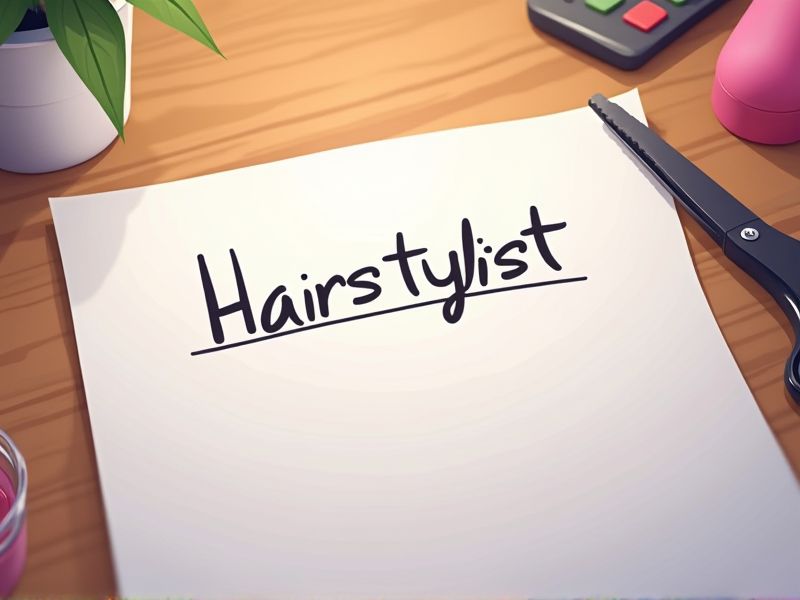
Hairstylists often require certain certifications due to the specialized skills and techniques involved in their profession, ensuring quality and consistency in services offered. Gaining these certifications signifies a standardized knowledge base, allowing stylists to adhere to safety protocols and industry regulations, which protects both client and stylist. These certifications often provide hairstylists with a competitive edge in the market, enhancing trust and credibility with clients. Some important certifications hairstylists may need include those in cosmetology, advanced coloring, and cutting techniques.
State Cosmetology License
A State Cosmetology License ensures that a hairstylist has received the necessary education and training to safely handle hair treatments. This licensing process establishes a standard of hygiene and safety, reducing the risk of infections or injuries to clients. It also brings credibility to the hairstylist's professional practice, fostering client trust. Regulatory oversight through licensing can protect consumers from unqualified individuals offering services.
Advanced Hair Cutting Certification
Pursuing advanced hair cutting certification for hairstylists often results in enhanced technical skills, increasing precision and creativity in their craft. Industry trends evolve rapidly, and this certification ensures professionals stay updated with contemporary techniques and styles. Clients typically trust and prefer certified stylists, which can lead to increased clientele and revenue. Hair salons aiming for high standards likely prioritize hiring certified professionals, impacting career growth opportunities positively.
Color Theory and Application Certification
A Color Theory and Application Certification equips hairstylists with advanced knowledge to understand how different hair hues can interact and affect overall aesthetics. Clients often have diverse and complex hair color requests, and certified knowledge ensures hairstylists can meet these expectations accurately. Mastery of color theory minimizes the risk of hair damage, as professionals can select safe and suitable products for color treatments. Possessing this certification often increases a hairstylist's credibility and can lead to more job opportunities and client trust.
Chemical Texture Services Certification
Chemical texture services involve the use of potent chemicals that can significantly alter hair structure, requiring hairstylists to possess specialized knowledge to ensure client safety. Certification equips hairstylists with essential skills to identify suitable products and techniques appropriate for different hair types, minimizing potential damage. Having certification also demonstrates a hairstylist's commitment to maintaining professional standards, which can enhance client trust and confidence. In many jurisdictions, regulatory bodies mandate such certification to ensure only qualified professionals administer potentially hazardous chemical treatments.
Hair Styling and Updo Certification
Hair styling and updo certification enhances a hairstylist's skills, leading to increased client trust and satisfaction. Certified stylists often attract a broader clientele, thereby boosting their earning potential. Salons frequently prefer or require certified stylists to maintain a high standard of service, thereby improving their reputation. Certification provides hairstylists with the latest techniques and trends, ensuring they remain competitive in the evolving beauty industry.
Barbering Certification
Barbering certification ensures hairstylists have met established standards for sanitation and safety, which protects public health. It provides hairstylists with a comprehensive understanding of various techniques and styles, enhancing their skill set and versatility. Obtaining certification can increase a hairstylist's credibility and trust with clients, leading to potential growth in clientele. Barbering certification may be required for legal compliance in many regions, allowing hairstylists to work professionally in licensed establishments.
Hair Extension Techniques Certification
Obtaining a Hair Extension Techniques Certification equips hairstylists with the specialized skills needed to apply, blend, and maintain extensions, ensuring client satisfaction and repeat business. Certification provides credibility and can attract a broader clientele, particularly those seeking professional services. Being certified reduces the likelihood of causing damage to a client's natural hair, as stylists learn best practices in maintenance and removal. Salons might require certification as part of their hiring criteria to uphold service quality standards.
Salon Sanitation and Safety Certification
In the salon industry, sanitation and safety certification equips hairstylists with essential knowledge to prevent the spread of infections and diseases, ensuring client health. The certification instills confidence in clients, as they are more likely to trust professionals who adhere to strict hygiene standards. Adhering to sanitary regulations decreases liability risks for salons, protecting businesses from legal consequences arising from poor hygiene practices. Regulatory compliance through certification contributes to maintaining industry standards and elevating the overall quality of service in the hairstyling sector.
Customer Service and Retail Sales Certification
Certification in Customer Service and Retail Sales enhances a hairstylist's ability to effectively communicate and build relationships with clients, which fosters customer loyalty and retention. This certification equips them with sales techniques, enabling them to recommend and sell hair care products, subsequently increasing revenue. Knowledge gained from these certifications helps manage client expectations and handle complaints professionally, leading to higher client satisfaction. By improving these skill sets, hairstylists position themselves competitively in the market, attracting more clientele and boosting their professional reputation.
Salon Management Certification
Salon Management Certification equips hairstylists with vital skills in business operations and financial management. It enhances their understanding of client relations and service quality, leading to increased customer satisfaction. Certification often improves job prospects and salary potential by demonstrating a commitment to professional development. Advanced knowledge in salon management can also empower hairstylists to effectively lead teams or even pursue entrepreneurial ventures.
Summary
As a reader considering a hairstylist with certifications, expect higher quality and expertise in service. Certifications often lead to trust and credibility in hairstylists, resulting in increased client satisfaction. This certification can also expand their skill set, offering more diverse and modern hairstyle options. Consequently, hairstylists with certifications may experience enhanced career opportunities and potentially higher earnings.
